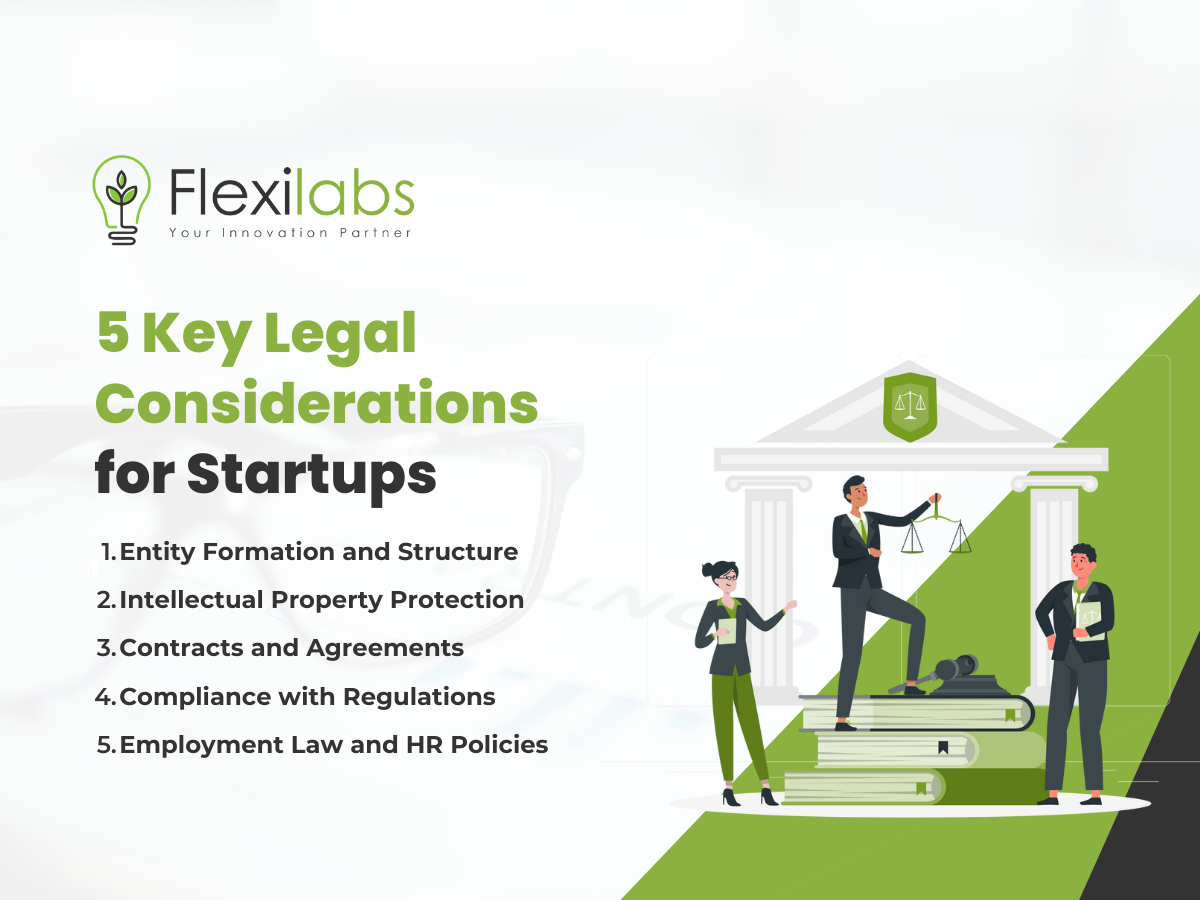In the fast-paced world of entrepreneurship, startups often face a multitude of challenges and hurdles. While creativity, innovation, and a solid business model are undoubtedly crucial for success, many aspiring entrepreneurs tend to overlook one critical aspect of their journey: legal considerations for startups.
Knowing the legalities is essential in any business. It provides sustainable growth and prevents any issue that could hinder opportunities for a business. As such, startups must navigate a web of legal considerations that can significantly impact their operations, protection, and prospects.
This comprehensive guide will delve into the importance of understanding the legal landscape, explore the five key legal considerations for startups, and provide valuable insights for startup founders and small business owners.
What is the importance of knowing legal considerations for startups?
Before we dive into the specific legal considerations, it’s essential to address the importance of understanding the legal landscape for startups.
Knowing the legal aspects is crucial for startups as it significantly shapes their success and sustainability. Startups often operate in a highly dynamic and competitive environment where regulations can change rapidly.
As such, understanding and complying with the legal requirements ensures smooth business operations and mitigates potential risks that could hinder growth. In fact, according to Failory, 2% of startups fail due to legal issues.
Likewise, here are some reasons why knowing the legal considerations for startups is essential:
1. Protecting Your Business
One of the primary reasons to focus on legal considerations for startups is to protect your business from potential risks and liabilities. Without a solid legal foundation, your startup could be vulnerable to threats like intellectual property theft, contract disputes, or compliance violations. Knowing the legal aspects of business can help safeguard your company’s assets and interests.
2. Attracting Investors and Partners
Investors and potential partners often scrutinise a startup’s legal framework before getting involved. A well-structured legal foundation can make your startup attractive to investors and potential collaborators. It demonstrates your commitment to compliance and the protection of their investments.
3. Preventing Costly Legal Battles
Startups often operate on tight budgets, making it imperative to avoid costly legal disputes. Understanding legal considerations can help you navigate potential pitfalls and conflicts, reducing the risk of expensive legal battles that can drain your resources and hamper your business’s growth.
4. Ensuring Long-term Viability
Compliance with legal regulations ensures your business can thrive in the long run. Ignoring legal considerations can lead to shutdowns, fines, and reputational damage. Knowing and adhering to the legal framework ensures your startup’s sustainability.
5. Building a Strong Reputation
Your startup’s reputation is a vital asset. Adhering to ethical and legal standards avoids damaging your reputation and contributes to building a robust and trustworthy brand image. Customers and clients are more likely to trust and engage with businesses prioritising legal compliance.
5 Key Legal Considerations for Startups
Now that we’ve established the importance of understanding legal considerations for startups let’s delve into the five key areas that demand your attention.

Entity Formation and Structure
One of a startup’s first and most critical legal considerations is how to structure your business. The choice of entity affects various aspects of your startup, including taxation, liability, and ownership. The most common business entities for startups are sole proprietorships, partnerships, limited liability companies (LLCs), and corporations. Each structure has its advantages and disadvantages. Here is the difference between them.
- Sole This is the simplest form of business entity. As a sole proprietor, you have complete control over your startup but are also personally liable for business debts and obligations.
- Partnership. Partnerships can be general or limited. Partners share equal responsibility for the business’s debts and decisions in a general partnership. Limited partnerships limit some partners’ liability while giving others more control over the company.
- Limited Liability Company (LLC). An LLC combines a corporation’s liability protection with a partnership’s simplicity and flexibility. It’s a popular choice for startups because it offers limited personal liability for members.
- Corporation. Corporations are separate legal entities from their owners, which means shareholders are not personally responsible for business debts. Corporations also offer the option to issue stock, making it easier to raise capital. However, they are subject to more regulatory requirements and taxation.
The choice of entity depends on your business goals and the level of protection you desire. Consult an attorney or a business advisor to determine which structure best suits your startup’s needs.
Intellectual Property Protection
Intellectual property (IP) is often one of the most valuable legal considerations for startups and assets for startups. Protecting your IP is crucial to maintaining your competitive advantage and preventing others from exploiting your ideas. There are several forms of IP protection:
- Registering a trademark protects your brand name, logo, or slogan from being used by others in a way that could confuse consumers. Trademarks are crucial for building brand recognition and trust.
- You should consider filing for a patent if your startup has invented a novel and non-obvious product or process. Patents grant exclusive rights to make, use, and sell your invention for a specified period.
- Copyrights protect original creative works, such as software, content, and art. Registering your copyright provides additional legal protections and may be required to enforce your rights in court.
- Trade Secrets. Trade secrets are valuable information that is kept confidential, such as business methods, customer lists, and proprietary formulas. Establishing security measures to protect trade secrets and having employees sign non-disclosure agreements (NDAs) are essential.
- Licensing If your startup plans to use someone else’s IP or license your IP to others, you’ll need well-drafted licensing agreements that specify terms and conditions.
Failure to protect your Intellectual property for startups can leave your startup vulnerable to infringement, which can be costly to litigate and damage your market position. Consult an intellectual property attorney to develop a strategy to safeguard your IP assets.
Contracts and Agreements
Contracts are the lifeblood of any business, and startups are no exception. It’s crucial to have clear and well-drafted contracts to establish the rights and obligations of all parties involved. Here are some key contracts and agreements that startups should consider:
- Founder’s Agreement. A founder’s agreement outlines co-founders’ roles, responsibilities, and equity distribution. It also addresses issues like decision-making, equity vesting, and dispute resolution.
- Employment Agreements. Employment contracts are one of startups’ most essential legal considerations. It should specify the terms of employment, including compensation, job duties, confidentiality, and non-compete clauses. They can help prevent misunderstandings and disputes with employees.
- Customer Contracts. Having clear terms and conditions, sales agreements, and service contracts is essential when dealing with customers. These documents can protect your interests and provide a legal framework for your business relationships.
- Vendor Agreements. If your startup relies on suppliers or service providers, vendor contracts should define each party’s scope of work, pricing, delivery terms, and responsibilities.
- Investor Agreements. If you seek external investment, you must draft agreements with investors. These agreements may include term sheets, convertible notes, or equity purchase agreements.
- Confidentiality Agreements (NDAs). NDAs are crucial when sharing sensitive information with employees, partners, or potential investors. They legally bind the receiving party to maintain the confidentiality of the disclosed information.
- Website and Mobile App Terms of Service and Privacy Policies. Online businesses must have legally compliant terms of service and privacy policies to protect user data and limit legal liabilities.
It’s essential to tailor contracts to your startup’s specific needs and have them reviewed by an attorney to ensure they are legally sound and enforceable.
Compliance with Regulations
Startups operate in a complex legal environment, subject to federal, state, and local regulations. Failure to comply with these laws and legal considerations for startups can result in fines, legal liabilities, and reputational damage. Here are some regulatory areas to consider:
- Business Licenses and Permits. Many businesses require licenses or permits to operate legally. The requirements vary by industry and location, so it’s essential to research and obtain the necessary licenses.
- Taxation. Understanding and complying with tax laws is crucial for startups. This includes income tax, sales tax, and employment taxes. Consider consulting with a tax professional to ensure proper tax planning.
- Data Privacy and Security. If your startup handles customer data, you must comply with privacy laws like the General Data Protection Regulation (GDPR) and the California Consumer Privacy Act (CCPA). Implementing data protection policies and practices is essential.
- Environmental Regulations. Depending on your business, you may need to adhere to environmental regulations, mainly when dealing with hazardous materials or energy consumption.
- Health and Safety Regulations. If your business operates in a physical location, you’ll need to follow health and safety regulations to protect employees and customers.
- Securities Laws. If your startup plans to raise capital by offering securities, you must comply with securities laws, which can be complex and involve various federal and state regulations.
- Employment Laws. Labour laws, such as wage and hour regulations, anti-discrimination laws, and workplace safety standards, apply to all businesses with employees.
Navigating these legal considerations and regulations can be challenging, so seeking legal counsel or consulting with industry-specific experts is advisable to ensure compliance.
Employment Law and HR Policies
Your employees are a vital part of your startup’s success. Managing your workforce requires compliance with employment laws and developing clear HR policies. Key aspects to consider in this regard include:
- Wage and Hour Laws. Ensure your employees are paid in compliance with federal and state minimum wage laws. Overtime rules, breaks, and meal periods must also be observed.
- Anti-Discrimination Laws. Title VII of the Civil Rights Act, the Americans with Disabilities Act, and other federal laws prohibit discrimination in employment. Familiarise yourself with these laws to avoid potential discrimination claims.
- Employee Handbooks. Creating an employee handbook with clearly defined policies on harassment, discrimination, discipline, and other workplace issues helps establish a positive and legally compliant work environment.
- Worker Classification. Correctly classifying your workers as employees or independent contractors is essential to avoid legal issues and tax liabilities.
- Termination and Severance. Develop clear termination procedures and consider offering severance agreements to departing employees. These agreements can help prevent disputes and protect your startup from legal action.
- Workplace Safety. Comply with workplace safety regulations to provide a safe and healthy working environment. Implement safety protocols and training programs as needed.
- Employee Benefits and Compensation. Understand and meet your obligations regarding employee benefits, including healthcare, retirement plans, and other benefits offered.
- Employee Contracts. As previously mentioned, having well-drafted employment contracts is essential to outline the terms and conditions of employment.
Incorporating HR policies and employment practices that adhere to these legal considerations for startups and standards is crucial for compliance and attracting and retaining talent. Violations of employment laws can result in costly lawsuits and damage your startup’s reputation.
Conclusion
In conclusion, startups face a myriad of legal considerations that can have a significant impact on their success and longevity. As such, addressing these legal aspects from the outset is essential to mitigate risks and protect your business.
Still, remember that legal considerations are not static; they evolve as your business grows and changes, so ongoing legal oversight is crucial as your startup matures. Seek legal counsel through in-house lawyers or external legal advisors for an investment in your startup’s future.
Flexilabs can hook you up with one! Get ready to navigate the legal landscape for your startup. Contact Flexilabs and let us help you start securing the future of your business!

